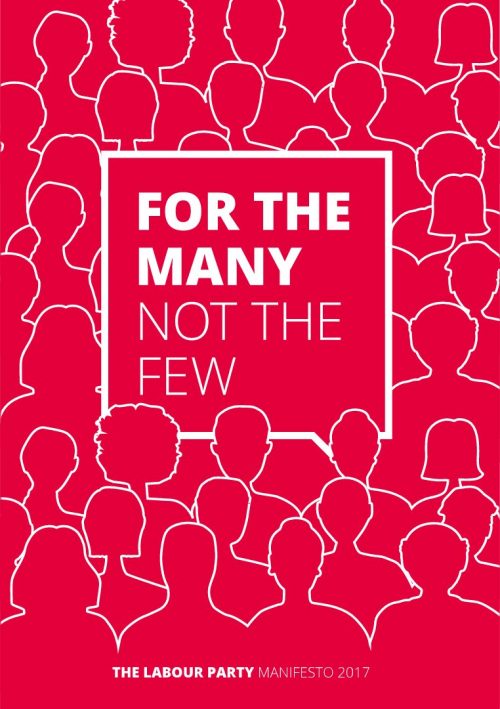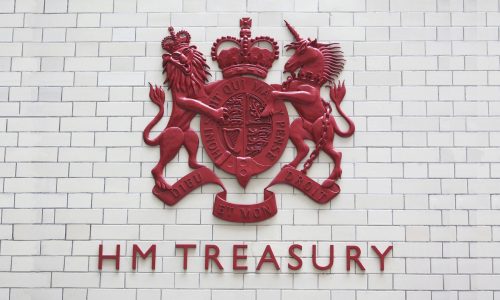Creating An Economy That Works For All is part of the Labour Parties 2017 General Election Manifesto.
Labour Manifesto 2017 PDF Format
Labour Manifesto 2017 – Creating An Economy That Works For All
- Creating An Economy That Works For All
- A Fair Taxation System
- Balancing The Books
- Infrastructure Investment
- Upgrading Our Economy: Labour’s Industrial Strategy
- Transforming Our Financial System
- A New Deal For Business
- Widening Ownership Of Our Economy
- Sustainable Energy
Creating An Economy That Works For All
Labour’s economic strategy is about delivering a fairer, more prosperous society for the many, not just the few.
We will measure our economic success not by the number of billionaires, but by the ability of our people to live richer lives.
Labour understands that the creation of wealth is a collective endeavour between workers, entrepreneurs, investors and government. Each contributes and each must share fairly in the rewards.
This manifesto sets out Labour’s plan to upgrade our economy and rewrite the rules of a rigged system, so that our economy really works for the many, and not only the few. Britain is the only major developed economy where earnings have fallen even as growth has returned after the financial crisis. Most working people in Britain today are earning less, after inflation, than they did ten years ago. Too many of us are in low-paid and insecure work. Too many of us fear our children will not enjoy the same opportunities that we have.
Labour will turn this around. We will upgrade our economy, breaking down the barriers that hold too many of us back, and tackling the gender pay gap. Our National Transformation Fund will deliver the investment that every part of Britain needs to meet its potential, overcoming years of neglect. Our industrial strategy will support businesses to create new, high- skilled, high-paid and secure work across the country, in the sectors of the future such as renewables. We will stop our financial system being rigged for the few, turning the power of finance to work for the public good. And we will put small businesses at the centre of our economic strategy.
The growth created by our national investment plan, underpinned by the responsible economic management embodied in our Fiscal Credibility Rule, will create good jobs, drive up living standards and improve the public finances.
It is a plan that will deliver Labour’s vision of an economy that works for the many, not just the few – a Britain in which no one is held back.
Our country and its people have been held back
A Fair Taxation System
Taxation is what underpins our shared prosperity. All of us, including business, benefit from a healthy, educated and skilled population, with access to basic services and secure housing.
We believe in the social obligation to contribute to a fair taxation scheme for the common good. We will take on the social scourge of tax avoidance through our Tax Transparency and Enforcement Programme, and close down tax loopholes.
But we will not ask ordinary households to pay more. A Labour government will guarantee no rises in income tax for those earning below £80,000 a year, and no increases in personal National Insurance Contributions or the rate of VAT.
Under Labour’s plans, 95 per cent of taxpayers will be guaranteed no increase in their income tax contributions, and everyone will be protected from any increase in personal National Insurance contributions and VAT. Only the top 5 per cent of earners will be asked to contribute more in tax to help fund our public services. We renew our pledge not to extend VAT to food, children’s clothes, books and newspapers, and public transport fares.
Corporation tax in the UK is the lowest of any major developed economy. Our new settlement with business will ask large corporations to pay a little more while still keeping UK corporation tax among the lowest of the major developed economies. In turn, we will meet the business need for a more skilled workforce with extra corporate tax revenues while contributing to education and skills budgets.
We will protect small businesses by reintroducing the lower small profits rate of corporation tax. We will also exclude small businesses from costly plans to introduce quarterly reporting and take action on late payments.
Labour will give HM Revenue & Customs the resources and skills necessary to clamp down hard on those unscrupulous few individuals and companies who seek to avoid the responsibilities that the rest of us meet.
Balancing The Books
Our manifesto is fully costed, with all current spending paid for out of taxation or redirected revenue streams. Our public services must rest on the foundation of sound finances. Labour will therefore set the target of eliminating the government’s deficit on day-to-day spending within five years.
But government must have a laser- like focus on how we earn, as well as how we spend. At the same time as eliminating the current deficit, Labour will invest in our future, to ensure faster growth and help us to earn our way as a country again.
To maintain good fiscal health, we will have a firm rule in place to guide all our taxation and spending decisions. Our Fiscal Credibility Rule is based on the simple principle that government should not be borrowing for day-to- day spending, but that future growth depends on investment. It was designed in conjunction with world- leading economists. It also means we are committed to ensuring that the national debt is lower at the end of the next Parliament than it is today.
Compliance with the rule will be overseen by a strengthened and truly independent Office for Budget Responsibility, which we will make accountable to Parliament. We will also consult on implementing the recommendations of the Kerslake Review of the Treasury.
Infrastructure Investment
Our country and its people have been held back by a lack of investment in the backbone of a modern economy – the infrastructure of transport, communications and energy systems. And when investment has happened, it has been too concentrated in too few places.
Labour will make different choices. We will take advantage of near- record low interest rates to create a National Transformation Fund that will invest £250 billion over ten years in upgrading our economy. We will ensure that the huge potential of every part of our country is met. The next Labour government will rebuild communities ripped apart by globalisation and neglected for years by government. We will rebuild and transform our economy so that it works for the many, not the few. So we will put in place tight rules to ensure that investment is fairly shared around every region and nation of the UK. We will tear down the barriers that have held too many people back.
A Labour government will complete the HS2 high-speed rail line from London through Birmingham to Leeds and Manchester, and then into Scotland, consulting with (and, where necessary, compensating) communities. We will link HS2 with other rail investments, such as Crossrail of the North (tying together our great northern cities) and on to the Durham Freight Centre. We will build a new Brighton Main Line for the South East.
In London, to ensure our capital continues to prosper, we will build Crossrail 2.
To harness the economic potential of new technologies and science, we will complete the Science Vale transport arc, from Oxford to Cambridge through Milton Keynes.
And we will deliver rail electrification and expansion across the whole country, including Wales and the South West.
We will transform our energy systems, investing in new, state- of-the-art low-carbon gas and renewable electricity production.
We will deliver universal superfast broadband availability by 2022. Labour will improve mobile internet coverage and expand provision of free public wi-fi in city centres and on public transport. We will improve 4G coverage and invest to ensure all urban areas, as well as major roads and railways, have uninterrupted 5G coverage. On day one we will instruct the National Infrastructure Commission to report on how to roll out ‘ultrafast’ (300Mbps) across the UK within the next decade.
Upgrading Our Economy: Labour’s Industrial Strategy
Our economy is suffering from years of neglect by governments that have refused to support our industries, businesses and workers. This wasted potential is holding us all back. Inequality has ballooned as the economy has shifted towards low-paid, insecure jobs.
Britain’s manufacturing base has declined and we have relied too heavily on the financial sector, centred on London and the South East. And while the South East struggles with a rising cost of living crisis, many northern and coastal towns have watched as their economies and communities are left behind. Britain’s failure to get all its regional and local economies working can be seen in the deterioration of the country’s current account, weak productivity growth and underinvestment in infrastructure.
Britain can only be stronger if every nation and region is given the resources and support to succeed. Only a Labour government with a credible industrial strategy can reach this untapped potential and deliver prosperity to every corner of our country, working with devolved administrations.
Our industrial strategy will be built on objective, measurable missions designed to address the great challenges of our times. In meeting these challenges, we will move beyond the narrow approaches of the past, and mobilise the talents and resources of our whole country to deliver an economy fit for the future.
The first missions set by a Labour government will be to:
- ensure that 60 per cent of the UK’s energy comes from zero-carbon or renewable sources by 2030
- create an innovation nation with the highest proportion of high- skilled jobs in the Organisation for Economic Co-operation and Development by 2030. We will meet the OECD target of 3 per cent of GDP spent on research and development by 2030.
In order to create a fertile ground for businesses to achieve these missions Labour will take action across the areas we know are necessary for business and industry to grow:
- Skills – by creating a National Education Service for England.
- Infrastructure – by investing £250 billion over the next ten years.
- UK supply chains – by targeting government support where there are gaps.
- Trade – by negotiating a new deal with Europe that puts jobs and the economy first.
- Procurement – by requiring the best standards on government contracts.
- Research and development – by committing extra research investment.
- Energy costs and security – by capping costs and investing in new publicly owned energy provision.
While our industrial strategy is one for growth across all sectors, Labour recognises that certain sectors are of strategic significance to the UK economy. For each strategic industry, the next Labour government will establish a council (modelled on the highly successful Automotive Council) to oversee its future security and growth. We will also encourage private investment by removing new plant and machinery from business rate calculations.
National and local government spends £200 billion a year in the private- sector procurement. Labour will put that spending power to good use to upgrade our economy, create good local jobs and reduce inequality. We will require firms supplying national or local government to meet the high standards we should expect of all businesses: paying their taxes, recognising trade unions, respecting workers’ rights and equal opportunities, protecting the environment, providing training, and paying suppliers on time. We will expect suppliers to reduce boardroom pay excesses by moving towards a 20:1 gap between the highest and lowest paid.
We will appoint a Digital Ambassador to liaise with technology companies to promote Britain as an attractive place for investment and provide support for start-ups to scale up to become world-class digital businesses. Our Digital Ambassador will help to ensure businesses are ready to grow and prosper in the digital age.
Transforming Our Financial System
A decade after the devastating international financial crisis, our financial system is still holding back too many of our small businesses and local economies.
Labour will transform how our financial system operates. Following the successful example of Germany and the Nordic countries, we will establish a National Investment Bank that will bring in private capital finance to deliver £250 billion of lending power.
This new public institution will support a network of regional development banks that, unlike giant City of London firms, will be dedicated to supporting inclusive growth in their communities. The banks will deliver the finance that our small businesses, co-operatives and innovative projects need across the whole country. The National Investment Bank will fill existing gaps in lending by private banks, particularly to small businesses, and by providing patient, long-term finance to R&D-intensive investments. It will also be given the task of helping to deliver our industrial strategy, by prioritising spending in line with its objectives.
Labour will overhaul the regulation of our financial system, putting in place a firm ring-fence between investment and retail banking that will protect consumers. We will take a new approach to the publicly-owned RBS, and launch a consultation on breaking up the bank to create new local public banks that are better matched to their customers’ needs. And we will extend existing Stamp Duty Reserve Tax to cover a wider range of assets, ensuring that the public gets a fairer share of financial system profits.
Labour will change the law so that banks can’t close a branch where there is a clear local need, putting their customers first. Britain has a successful international finance industry, but we also need a strong, safe and socially useful banking system to meet the needs of our own regional economies and communities. We will commit to creating a more diverse banking system, backed up by legislation.
A New Deal For Business
The majority of businesses play by the rules: they pay their taxes and their workers reasonably and on time, and they operate with respect for the environment and local communities. That is why it is vital that government ensures that businesses doing the right thing are rewarded rather than undercut or outbid by those unscrupulous few that cut corners, whether on taxes, workers’ conditions, environmental standards, or consumer safety and protection.
But our business culture doesn’t always work like this. Scandals such as the failure of BHS show how the long- term growth of a company can be sacrificed for the sake of a quick buck.
When shareholders are looking for quick short-term returns, they encourage companies to cut corners. That means they look to cut wages, instead of investing for the long term, or they spend longer inventing new tax avoidance schemes than they do inventing new products.
By reforming the rules our companies operate under, we can make sure they stay focused on delivering shared wealth. Labour will amend company law so that directors owe a duty directly not only shareholders, but to employees, customers, the environment and the wider public, and we will consult on bringing forward appropriate legislation within this Parliament.
Labour will amend the takeover regime to ensure that businesses identified as being ‘systemically important’ have a clear plan in place to protect workers and pensioners when a company is taken over. Labour will also legislate to reduce pay inequality by introducing an Excessive Pay Levy on companies with staff on very high pay.
Our small and medium-sized enterprises (SMEs) are the backbone of our economy, providing 60 per cent of private-sector jobs. Technological changes, like the spread of digital manufacturing and rapid communication, mean smaller, faster businesses will be the future of our economy.
Yet this Conservative Government has taken small businesses for granted. Labour is the party of small businesses. We understand the challenges our smaller businesses face. In order to provide the support many small businesses need, a Labour government will:
- Mandate the new National Investment Bank, and regional development banks in every region, to identify where other lenders fail to meet the needs of SMEs and prioritise lending to improve the funding gap.
- Reinstate the lower small-business corporation tax rate.
- Introduce a package of reforms to business rates – including switching from RPI to CPI indexation, exempting new investment in plant and machinery from valuations, and ensuring that businesses have access to a proper appeals process – while reviewing the entire business rates system in the longer run.
- Scrap quarterly reporting for businesses with a turnover of under £85,000.
- Declare war on late payments by:
- Using government procurement to ensure that anyone bidding for a government contract pays its own suppliers within 30 days.
- Developing a version of the Australian system of binding arbitration and fines for persistent late-payers for the private and public sectors.
We will also bring forward legislation to create a proper legal definition for co-operative ownership. The National Investment Bank and regional development banks will be charged with helping support our co-operative sector. Labour will aim to double the size of the co-operative sector in the UK, putting it on a par with those in leading economies like Germany or the US.
Widening Ownership Of Our Economy
Britain is a long-established democracy. But the distribution of ownership of the country’s economy means that decisions about our economy are often made by a narrow elite. More democratic ownership structures would help our economy deliver for the many and lead to a fairer distribution of wealth.
In government, Labour would give more people a stake – and a say – in our economy by doubling the size of the co-operative sector and introducing a “right to own,” making employees the buyer of first refusal when the company they work for is up for sale. We will act to ‘insource’ our public and local council services as preferred providers.
Many basic goods and services have been taken out of democratic control through privatisation. This has often led to higher prices and poorer quality, as prices are raised to pay out dividends. For example, water bills have increased 40 per cent since privatisation, and our private energy providers overcharged customers by £2 billion in 2015. In private hands, Royal Mail has increased stamp and parcel charges, and failed to meet its customer service obligations, while its owners trade shares at significant profit. The Conservative Government’s privatisation of Royal Mail was a historic mistake, selling off another national asset on the cheap.
Across the world, countries are taking public utilities back into public ownership. Labour will learn from these experiences and bring key utilities back into public ownership to deliver lower prices, more accountability and a more sustainable economy. We will:
- Bring private rail companies back into public ownership as their franchises expire.
- Regain control of energy supply networks through the alteration of operator license conditions, and transition to a publicly owned, decentralised energy system.
- Replace our dysfunctional water system with a network of regional publicly-owned water companies.
- Reverse the privatisation of Royal Mail at the earliest opportunity.
Public ownership will benefit consumers, ensuring that their interests are put first and that there is democratic accountability for the service.
Sustainable Energy
Labour’s energy policy is built on three simple principles:
- To ensure security of energy supply and ‘keep the lights on’.
- To ensure energy costs are affordable for consumers and businesses.
- To ensure we meet our climate change targets and transition to a low-carbon economy.
The UK energy system is outdated, expensive and polluting. Privatisation has failed to deliver an energy system that delivers for people, businesses or our environment.
One in ten households are in fuel poverty, yet the Competition Markets Authority found customers are overcharged an enormous £2 billion every year.
Labour understands that many people don’t have time to shop around, they just want reliable and affordable energy. So the next Labour Government will:
- Introduce an immediate emergency price cap to ensure that the average dual-fuel
- household energy bill remains below £1,000 per year, while we transition to a fairer system for bill payers.
- Take energy back into public ownership to deliver renewable energy, affordability for consumers, and democratic control. We will do this in the following stages:
- Regaining control of energy supply networks through the alteration of the National and Regional Network Operator license conditions.
- Supporting the creation of publicly owned, locally accountable energy companies and co-operatives to rival existing private energy suppliers, with at least one if every region.
- Legislating to permit publicly owned local companies to purchase the regional grid infrastructure, and to ensure that national and regional grid infrastructure is brought into public ownership over time.
Labour will insulate four million homes as an infrastructure priority to help those who suffer in cold homes each winter. This will cut emissions, improve health, save on bills, and reduce fuel poverty and winter deaths.
Homeowners will be offered interest- free loans to improve their property. For renters, Labour will improve on existing Landlord Energy Efficiency regulations and re-establish the Landlord Energy Saving Allowance to encourage the uptake of efficiency measures.
Labour will ban fracking because it would lock us into an energy infrastructure based on fossil fuels, long after the point in 2030 when the Committee on Climate Change says gas in the UK must sharply decline.
Emerging technologies such as carbon capture and storage will help to smooth the transition to cleaner fuels and to protect existing jobs as part of the future energy mix. To safeguard the offshore oil and gas industry, we will provide a strategy focused on protecting vital North Sea assets, and the jobs and skills that depend on them.
We are committed to renewable energy projects, including tidal lagoons, which can help create manufacturing and energy jobs as well as contributing to climate- change commitments.
The UK has the world’s oldest nuclear industry, and nuclear will continue to be part of the UK energy supply. We will support further nuclear projects and protect nuclear workers’ jobs and pensions. There are considerable opportunities for nuclear power and decommissioning both internationally and domestically.
Building a clean economy of the future is the most important thing we must do for our children, our grandchildren and future generations. Yet recent years have seen a failure to progress towards our targets. A Labour government will put us back on track to meet the targets in the Climate Change Act and the Paris Agreement.
The low-carbon economy is one of the UK’s fastest-growing sectors, creating jobs and providing investment across each region. It employed an estimated 447,000 employees in the UK in 2015 and saw over £77 billion in turnover. With backing from a Labour government, these sectors can secure crucial shares of global export markets.
Currently, the UK buys and sells energy tariff free from Europe, an arrangement which saves families and businesses money, and helps balance the power grid. As part of the Brexit negotiations, Labour will prioritise maintaining access to the internal energy market. Labour will also retain access to Euratom, to allow continued trade of fissile material, with access and collaboration over research vital to our nuclear industry.
Labour Parties 2017 General Election Manifesto
Labour Manifesto 2017 – Foreward
Labour Manifesto 2017 – Creating An Economy That Works For All
Labour Manifesto 2017 – Negotiating Brexit
Labour Manifesto 2017 – Towards A National Education Service
Labour Manifesto 2017 – A Fair Deal At Work
Labour Manifesto 2017 – Social Security
Labour Manifesto 2017 – Secure Homes For All
Labour Manifesto 2017 – Healthcare For All
Labour Manifesto 2017 – Safer Communities
Labour Manifesto 2017 – Leading Richer Lives
Labour Manifesto 2017 – Extending Democracy
Labour Manifesto 2017 – A More Equal Society
Labour Manifesto 2017 – A Global Britain






















Pretty much everyone works hard to provide for their family.
So why haven’t the Tories done anything about the slowest wage growth in the developed world, the longest fall in living standards since the 19th century, and a massive fall in full-time work: All while the richest have doubled their wealth?
The game is clearly rigged in favour of those who have hoarded the most cash!
It’s time for a change, it’s time for a Labour government that cares for the working class of Britain.